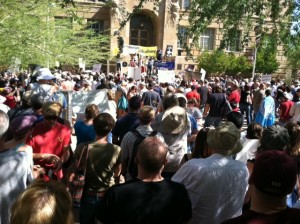The irony is that for all the time and energy and resources China throws into censoring its Internet, the more creative, ingenious and brilliant those striving to subvert the system become. And the more brilliant and ingenious they are, the more attention they get, and the attempts to censor information blow up in the censors’ faces.
This is an absolutely marvelous article, a look at how the wit and humor of irreverent, mischievous bloggers, microbloggers and online artists is confounding China’s fleet of Web censors and doing achieving exactly what the censors are fighting: the delivery of mocking, critical messages revealing the injustices of the Chinese government.
No government in the world pours more resources into patrolling the Web than China’s, tracking down unwanted content and supposed miscreants among the online population of 500 million with an army of more than 50,000 censors and vast networks of advanced filtering software. Yet despite these restrictions — or precisely because of them — the Internet is flourishing as the wittiest space in China. “Censorship warps us in many ways, but it is also the mother of creativity,” says Hu Yong, an Internet expert and associate professor at Peking University. “It forces people to invent indirect ways to get their meaning across, and humor works as a natural form of encryption.”
To slip past censors, Chinese bloggers have become masters of comic subterfuge, cloaking their messages in protective layers of irony and satire. This is not a new concept, but it has erupted so powerfully that it now defines the ethos of the Internet in China. Coded language has become part of mainstream culture, with the most contagious memes tapping into widely shared feelings about issues that cannot be openly discussed, from corruption and economic inequality to censorship itself. “Beyond its comic value, this humor shows where netizens are pushing against the boundaries of the state,” says Xiao Qiang, an adjunct professor at the University of California, Berkeley, whose Web site, China Digital Times, maintains an entertaining lexicon of coded Internet terms. “Nothing else gives us a clearer view of the pressure points in Chinese society.”
I have posted before about the CCP’s total lack of a sense of humor. Every year in America the president of the United States gets roasted at the White House Correspondents dinner. No government figure here or in most free countries is spared from being laughed at. But can anyone actually imagine the CCP laughing at itself? How surprising, that it’s authoritarian and totalitarian regimes that are utterly devoid of humor. Anything that challenges such governments’ monolithic image of paternalism and benevolence is a threat: jokes unveil weaknesses in the rulers, they reveal vulnerabilities, and if they’re really funny they spread like wildfire. Small wonder that those making the jokes are considered lethal enemies.
Satire is sometimes a safety valve that government might grudgingly permit. Better a virtual laugh, after all, than a real protest. But being laughed at, as Orwell found during his stint as a colonial police officer in Burma, can also be a ruler’s greatest fear. And the Chinese government, which last year sentenced a woman to a year of hard labor for a sarcastic three-word tweet, appears to suffer from an acute case of humor deficiency. “Jokes that mock the abuse of power do more than let off steam; they mobilize people’s emotions,” says Wen Yunchao, an outspoken blogger who often mounts sardonic Internet campaigns in defense of free speech. “Every time a joke takes off,” Wen says, “it chips away at the so-called authority of an authoritarian regime.”
This exhaustive article reads like a thriller and is a good reminder of why we need professional journalists. While it’s largely about humor, and while some of the examples are pretty hilarious (be sure to read the one about Mao), it is anything but funny. The political reality is utterly grim. The use of humor is a last resort, a desperate attempt to enlighten and inform the masses, and a dangerous game. These are acts of incredible courage, and there’s no way China can wipe them out unless it turns the entire Internet off, and cell phones, too. These are real freedom fighters (or “freedom-of-speech fighters”).
Update: Relatedly, you’ll want to read this. These censors must be very busy men.
And then there’s this. What’s going on tonight?


Comments